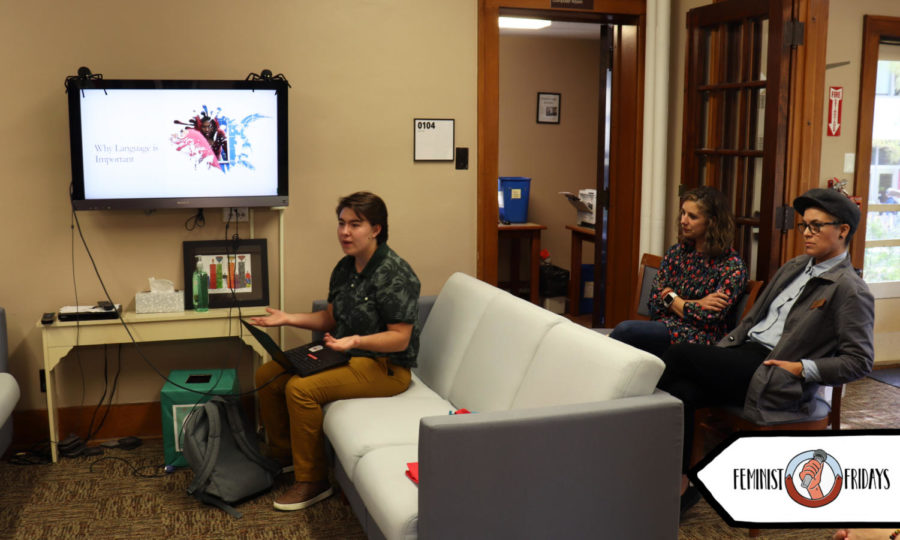Speaker connects non-binary identities and language
Feminist Friday speaker Danny Cook, senior in communication studies, led a group discussion titled “L’Ecricture Non-Binaire” on Oct. 18.
October 18, 2019
At this week’s Feminist Friday, attendees had a chance to discuss the use of language surrounding non-binary identities.
Danny Cook, a senior in communication studies, lead the audience in a discussion of whether or not language surrounding genders beyond male and female need to change in order to represent all people and all binaries due to the multitude of experiences everyone has.
While language has made progress in many ways to be more inclusive many fear that assimilating and accepting minor alterations in our preexisting language to merely include differing genders is not enough and will diffuse the culture and people’s individuality. Solely adding vocabulary to describe people’s orientation or their preferred identity is interpreting still from a male and female grammatical vocabulary, according to Cook.
“Increasing mindfulness and awareness of language is how we inform a sense of culture,” Cook said.
Putting the idea into play of redrafting an entire language is difficult and Cook said there happens to be a lot of push back in the LGBTQIA+ community for such a radical change. According to Cook, many feel the ongoing attempts of inclusion are justified and satisfactory, while calling for more attention and demands for people to change to fit few needs is overabundant.
Cook said regardless of where one’s person point of view may lay in this controversy language changes or inclusive languages are nothing new.
According to Cook, languages including Assamese, Bengali, Maithili, Nepali and Oriya already refer to professions, pronouns and adjectives gender neutrally. Chinese, Finnish, and Turkish languages already lack grammatical gender, thus they are already gender inclusive.
Countries such as Sweden and Britain are making progress in the effort to end the use of gender specific words, with the United States, Canada, United Kingdom and Australia closely following.
“We need to think more critically about including people in the first place,” Cook said. “Non-binary is not being a man or a woman, I see it more as an umbrella, or a catch all for identities that fall outside a gender binary of either identifying as a man or as a woman. Those who could experience gender in whatever ways individual to them whether that means how they present or identify. Or even if they’re being more masculine or more feminine, but don’t identify as being a man or being a woman.”
During the discussion, Cook noted a few languages that came about an attempt to be more gender neutral or inclusive. The language of Lóxoro in Peru is similar to Spanish but is indecipherable to native Spanish speakers, as it was a language practiced particularly for gay and transgender individuals in the community for their own individuality as well as safety.
Similarly, the language of Esperanto is a universal language and possesses a mere two personal pronouns “li” and “ŝi”, meaning he and she. The third pronoun, “ĝi”, is used to be gender neutral but can be seen as offensive because it’s simultaneously used for reference to kids.
Next week’s Feminist Friday will occur at 1 p.m. in the Sloss House and discuss women’s involvement in the military.







